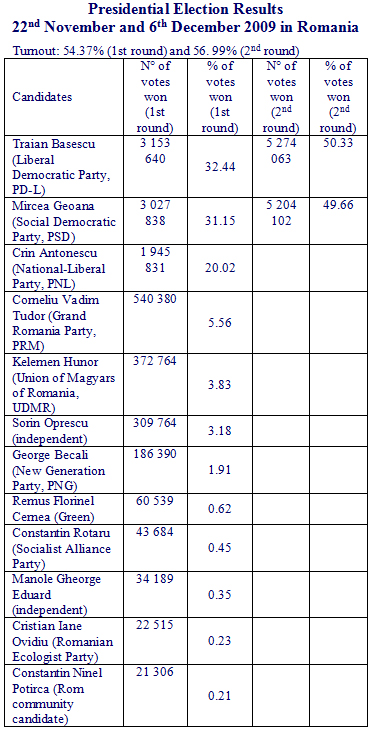Results
News
Corinne Deloy,
Fondation Robert Schuman,
Helen Levy
-

Available versions :
EN

Corinne Deloy
Fondation Robert Schuman
Helen Levy
Outgoing Head of State, Traian Basescu (Democratic Liberal Party, PD-L) won the second round of the presidential election on 6th December – an election that was believed to one of the most important in the country's history twenty years after the fall of the communist dictator Nicolae Ceaucescu. With 50.33% of the vote he beat Social Democratic leader (PSD) and present President of the Romanian Senate, Mircea Geoana who won 49.66% of the vote.
In the first round on 22nd November the two men ran neck and neck, Traian Basescu won 32.44% ahead of Mircea Geoana, 31.5%. The latter was however declared the favourite in the second round by all of the polling institutes after the third political party, the National Liberal Party (PNL) joined forces with him. The outgoing President revealed the pollsters wrong as they credited his rival with around 54% of the vote.
Turnout rose to 56.99%, ie + 2.62 points in comparison with the first round.
Both men each claimed victory on the announcement of the first results: exit polls gave an easy victory to Mircea Geoana before the counting revealed that the outgoing President had won. This was therefore a repeat of the presidential election of 28th November and 12th December 2004 when Traian Basescu was at first declared loser then winner by a very narrow margin ahead of his adversary – 51.23% - Social Democrat Adrian Nastase who won 48.77% of the vote.
"I won. I can tell you that at 1900 the right polls showed that I had drawn ahead of Mircea Geoana," said Traian Basescu as soon as the polling stations closed, contesting the polls and speaking of "manipulation" on the part of the TV channels. "You will see the manipulation on the part of the TV channels who have been doing this for the last three years. Today you can be totally confident in me when I say I won," he repeated.
Traian Basescu supports "stepping up the pace of reform" notably in areas such as education and the running of the State. He also said he wanted to decrease public spending.
The President of the Republic is rapidly due to appointment a new Prime Minister who will have to form a stable government to re-initiate talks with the IMF with regard to a 20 billion euro loan. Since the collapse of the PD-L/PSD coalition on 1st October last and Parliament's approval 12 days later of a motion of censure that led to the fall of Emil Boc's government (PD-L), Romania has been led by an interim government.
Traian Basescu said that the PD-L, isolated after the agreement signed between the PSD and the PNL between the two rounds of the presidential election, would manage to find government partners. On 4th December he appealed to the PNL indicating that Romania needed an alliance of rightwing parties in order to complete the reforms.
The new government will also have to push through the 2010 draft budget which is vital for the IMF to grant the first 1.5 billion euro of its 20 billion euro loan. The IMF said that it would not resume discussions with the Romanian authorities until a new government had been appointed.
Traian Basescu is 58 and nicknamed "Popeye" due to his past as a merchant trade officer; he is a graduate of the Naval Institution of Constanza. Minister of Transport from 1991-1992 then from 1996-2000 he was elected Mayor of Bucharest in 2000 and re-elected in the first round in 2004 winning by a narrow margin ahead of the Foreign Minister at the time, Mircea Geoana. In 2004 the defection of Theodor Dimitriu Stolojan – for health reasons – made Traian Basescu his party's candidate in the presidential race which he narrowly won. Suspended from office from 20th April 2007 to 23rd May 2007 after a vote by Parliament – MPs accused him amongst other things of infringing the Constitution – Traian Basescu recovered power after the successful referendum on 19th May 2007 when 74.48% of the electorate refused his impeachment.
"Whoever wins the President will not have time to celebrate. He will have settle the critical situation the country finds itself in and patch up the cracks that have emerged in society," indicated political analyst Emil Hurezeanu on the TV channel Realitatea TV. Indeed after ten years of exceptional growth, the Romanian GDP rose to 7.1% in 2008, but this year it is due to contract by 7.5% (and by 1% in 2010). The public deficit is due to reach 7.3% of the GDP and unemployment 7.5% of the working population by the end of 2009. The leu, the national currency has lost 4.7% of its value against the euro since the beginning of the year. The President now has three election free years to bring Romania out of the economic crisis and start vital reforms to modernize the country.
 Source : Internet Site of the Romanian Central Electoral Bureau:http://www.bec2009p.ro/rezultate.html
Source : Internet Site of the Romanian Central Electoral Bureau:http://www.bec2009p.ro/rezultate.htmlOn the same theme
To go further
Elections in Europe
Corinne Deloy
—
4 November 2025
Elections in Europe
Corinne Deloy
—
28 October 2025
Elections in Europe
Corinne Deloy
—
14 October 2025
Elections in Europe
Corinne Deloy
—
7 October 2025

The Letter
Schuman
European news of the week
Unique in its genre, with its 200,000 subscribers and its editions in 6 languages (French, English, German, Spanish, Polish and Ukrainian), it has brought to you, for 15 years, a summary of European news, more needed now than ever
Versions :



